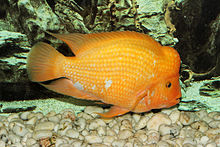Amphilophus
Amphilophus adalah genus ikan siklid yang berasal dari Amerika Tengah. Persebarannya dimulai dari Meksiko selatan hingga Panama. Genus ini sekarang mengandungi 23 spesies ikan, termasuk beberapa yang terkenal dari perdagangan ikan hias akuarium. Namun penelitian yang dipimpin oleh Oldřich Říčan pada tahun 2008 dan 2016 menunjukkan bahwa beberapa spesies dalam genus ini harus dipindahkan ke genus Astatheros.[1][2] Spesies yang diusulkan untuk dipindahkan ke Astatheros pada tahun 2008 adalah A. alfari, A. altifrons, A. bussingi, A. diquis, A. longimanus, A. macracanthus (yang merupakan spesies tipe untuk genus Astatheros), A. margaritifer, A. rhytisma, A. robertsoni dan A. rostratus. Studi genetik lebih lanjut membuat Říčan memasukkan spesies A. macracanthus ke dalam genus Astatheros; tetapi memasukkan A. alfari, A. altifrons, A. bussingi, A. diquis, A. longimanus, A. rhytisma, A. robertsoni dan A. rostratus ke dalam genus Cribroheros.[2] Studi Říčan menunjukkan bahwa spesies Astatheros lebih dekat kekerabatannya dengan Spesies Rocio octofasciata dan Herotilapia multispinosa dibandingkan dengan spesies Amphilophus yang tersisa.[1]
| Amphilophus | |
|---|---|

| |
| Amphilophus citrinellus | |
| Klasifikasi ilmiah | |
| Domain: | Eukaryota |
| Kerajaan: | Animalia |
| Filum: | Chordata |
| Kelas: | Actinopterygii |
| Ordo: | Cichliformes |
| Famili: | Cichlidae |
| Tribus: | Heroini |
| Genus: | Amphilophus Agassiz, 1859 |
| Spesies tipe | |
| Amphilophus froebelii Agassiz, 1859
| |
| Spesies | |
|
Lihat teks | |
| Sinonim | |
| |
Beberapa spesies ikan dari genus ini merupakan ikan endemik di Laguna Apoyo (6 spesies) dan Danau Xiloá (4 spesies) di Nikaragua, dan diyakini sebagai hasil spesiasi simpatrik.[3]
- Amphilophus amarillo Stauffer & McKaye, 2002
- Amphilophus astorquii Stauffer, McCrary & K. E. Black, 2008[7]
- Amphilophus chancho Stauffer, McCrary & K. E. Black, 2008[7]
- Amphilophus citrinellus (Günther, 1864)
- Amphilophus flaveolus Stauffer, McCrary & K. E. Black, 2008[7]
- Amphilophus globosus Geiger, McCrary & Stauffer, 2010[8]
- Amphilophus hogaboomorum (Carr & Giovannoli, 1950)
- Amphilophus labiatus (Günther, 1864) – Setan merah atau Red devil
- Amphilophus lyonsi (J. P. Gosse, 1966)
- Amphilophus margaritifer (Günther, 1862)
- Amphilophus sagittae Stauffer & McKaye, 2002
- Amphilophus supercilius Geiger, McCrary & Stauffer, 2010[8]
- Amphilophus tolteca Recknagel, Kusche, Elmer & A. Meyer, 2013[5]
- Amphilophus viridis Recknagel, Kusche, Elmer & A. Meyer, 2013[5]
- Amphilophus xiloaensis Stauffer & McKaye, 2002
- Amphilophus zaliosus (Barlow, 1976)
Referensi
sunting- ^ a b Heijns, W. (July 2009). "Central American heroine cichlids, a phylogenetic approach". Cichlid News. hlm. 14–22.
- ^ a b c Říčan, O.; Piálek, L.; Dragová, K.; Novák, J. (2016). "Diversity and evolution of the Middle American cichlid fishes (Teleostei: Cichlidae) with revised classification" (PDF). Vertebrate Zoology. 66 (1): 1–102. Diarsipkan dari versi asli (PDF) tanggal 2016-04-05. Diakses tanggal 2019-01-25.
- ^ Dittmann, Roesti, Indermaur, Colombo, Gschwind, Keller, Kovac, Barluenga, Muschick, and Salzburger (2012). Depth-dependent abundance of Midas Cichlid fish (Amphilophus spp.) in two Nicaraguan crater lakes. Hydrobiologia 686(1): 277-285.
- ^ Froese, Rainer and Pauly, Daniel, eds. (2019). Species of Amphilophus di FishBase. Versi July 2019.
- ^ a b c Recknagel, H., Kusche, H., Elmer, K.R. & Meyer, A. (2013): Two new endemic species in the Midas cichlid species complex from Nicaraguan crater lakes: Amphilophus tolteca and Amphilophus viridis (Perciformes, Cichlidae).[pranala nonaktif permanen] aqua, International Journal of Ichthyology, 19 (4): 207-224.
- ^ Templat:Cof genus
- ^ a b c Stauffer; McCrary; Black (2008). "Three new species of cichlid fishes (Teleostei: Cichlidae) from Lake Apoyo, Nicaragua". Proceedings of the Biological Society of Washington. 121 (1): 117–129. doi:10.2988/06-37.1. [1] Diarsipkan 2011-10-03 di Wayback Machine.
- ^ a b Geiger; McCrary; Stauffer (2010). "Description of two new species of the Midas cichlid complex (Teleostei: Cichlidae) from Lake Apoyo, Nicaragua". Proceedings of the Biological Society of Washington. 123 (2): 159–173. doi:10.2988/09-20.1. [2] Diarsipkan 2011-10-03 di Wayback Machine.
.